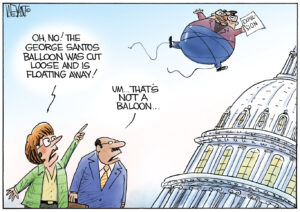Don’t Believe Everything You Read About Michele Bachmann — or Anyone Else
In today’s tight media economy, reporters tend to be young, overworked, underpaid, inexperienced journalists grateful for their jobs and afraid of being fired. Their bosses, no doubt, are just as fearful. These journalists are easy marks for campaign hacks with a story to sell.In today’s tight media economy, reporters are easy marks for campaign hacks with a story to sell.
The Michele Bachmann migraine story appeared in time to potentially derail her candidacy just as the congresswoman was threatening to move to the head of the pack in the race for the Republican presidential nomination.
Don’t misunderstand me. I don’t want her to win anything. She is a right-wing, religious-fundamentalist extremist who recklessly plays the race card, the anti-gay card and whatever other card that will heat up her tea party base. And, since she’s running for president, her health is public property. But I don’t like the way the story emerged. It’s a product of the incestuous relationship of political campaign managers and journalists, who are fond of calling themselves “guardians of democracy.”
The story first ran on the conservative website The Daily Caller on July 18 under the headline “Stress-related condition ‘incapacitates’ Bachmann; heavy pill use alleged.” Not until the ninth paragraph does the story say Bachmann has migraines and takes medication for the condition. After the story appeared, Bachmann confirmed she suffered from migraines.
The story was a classic of underhanded politics. The sources were “a former aide, … three people who worked closely with Bachmann, … an adviser … involved in her 2010 congressional campaign, … sources who spoke to the Daily Caller … because they are terrified about the impact the condition could have on Bachmann’s performance if she actually became president.” The Caller said it was granting these sources “anonymity because they were providing information only a select group of people could know at great professional risk.”
The story raced from The Daily Caller into mainstream television and print. ABC News was working on a Bachmann migraine exposé when the Caller published its own article. The story reached The New York Times and the rest of the mainstream media and was a favored topic of cable talkers. Campaigning in Iowa, Bachmann, who had moved to first place in polling for next year’s Iowa caucuses, spent time answering questions about her migraines instead of her favorite right-wing issues.
Reporters covering the Iowa campaign were curious about the origin of the story. The Des Moines Register reported that they asked former Gov. Tim Pawlenty of Minnesota, who has been campaigning hard in Iowa but remains low in the polls, if his staff had anything to do with The Daily Caller story. Pawlenty, dancing around the question, said senior aides “indicated directly and unequivocally that they didn’t push the story.” One of his supporters is Ron Carey, Bachmann’s former chief of staff, who wrote in The Des Moines Register, “Having seen the two of them, up close and over a long period of time, it is clear to me that while Tim Pawlenty possesses the judgment, the demeanor, and the readiness to serve as president, Michele Bachmann decidedly does not.” Pawlenty told reporters “I haven’t spoken to him but the story’s not sourced to him, it’s sourced to her former staff.”
Anonymous sources are a major news business concern, as demonstrated in the New York Times policy on such sources: “The use of unidentified sources is reserved for situations in which the newspaper could not otherwise print information it considers reliable and newsworthy. When we use such sources, we accept an obligation not only to convince a reader of their reliability but also to convey what we can learn of their motivation — as much as we can supply to let a reader know whether the sources have a clear point of view on the issue under discussion.”
The right of reporters to protect the identities of sources is assured by law in much of the country. The Society of Professional Journalists noted that 49 states have laws or operate under court rulings that grant journalists and their sources the right to shield from the public their confidential dealings with sources. The so-called shield laws generally replicate the rights granted clergy and the people they counsel, lawyers and their clients, and psychological therapists and their clients.
Many reporters, including me, don’t like such sources. Part of a reporter’s skill is the ability to talk a reluctant source into using his or her name.
But laws and policies are no match for the high speed of a 21st century political campaign, as well as the 24-hour cable news shows and the Internet, with its countless websites and blogs.
Internet enterprises are desperate for visitors to read their pages. They need hot stories presented in a provocative manner. The Bachmann story in The Daily Caller was a winner with its headline words “incapacitates” and “drug use.” These words would generate much more traffic than “migraines.”
Reporters are under heavy pressure to produce such stories. In today’s tight media economy, reporters tend to be young, overworked, underpaid, inexperienced journalists grateful for their jobs and afraid of being fired. Their bosses, no doubt, are just as fearful. These journalists are easy marks for campaign hacks with a story to sell.
Such stories should contain a consumer’s warning: Don’t believe everything you read or hear. Ask yourselves where these stories come from. What are the sources’ motives? Smart readers should want to know.
The source of the migraine story will probably never be known. What is certain is that many more such stories will appear during the presidential campaign. When they do, the journalists who should be protecting democracy will actually be subverting it.
Your support matters…Independent journalism is under threat and overshadowed by heavily funded mainstream media.
You can help level the playing field. Become a member.
Your tax-deductible contribution keeps us digging beneath the headlines to give you thought-provoking, investigative reporting and analysis that unearths what's really happening- without compromise.
Give today to support our courageous, independent journalists.






You need to be a supporter to comment.
There are currently no responses to this article.
Be the first to respond.